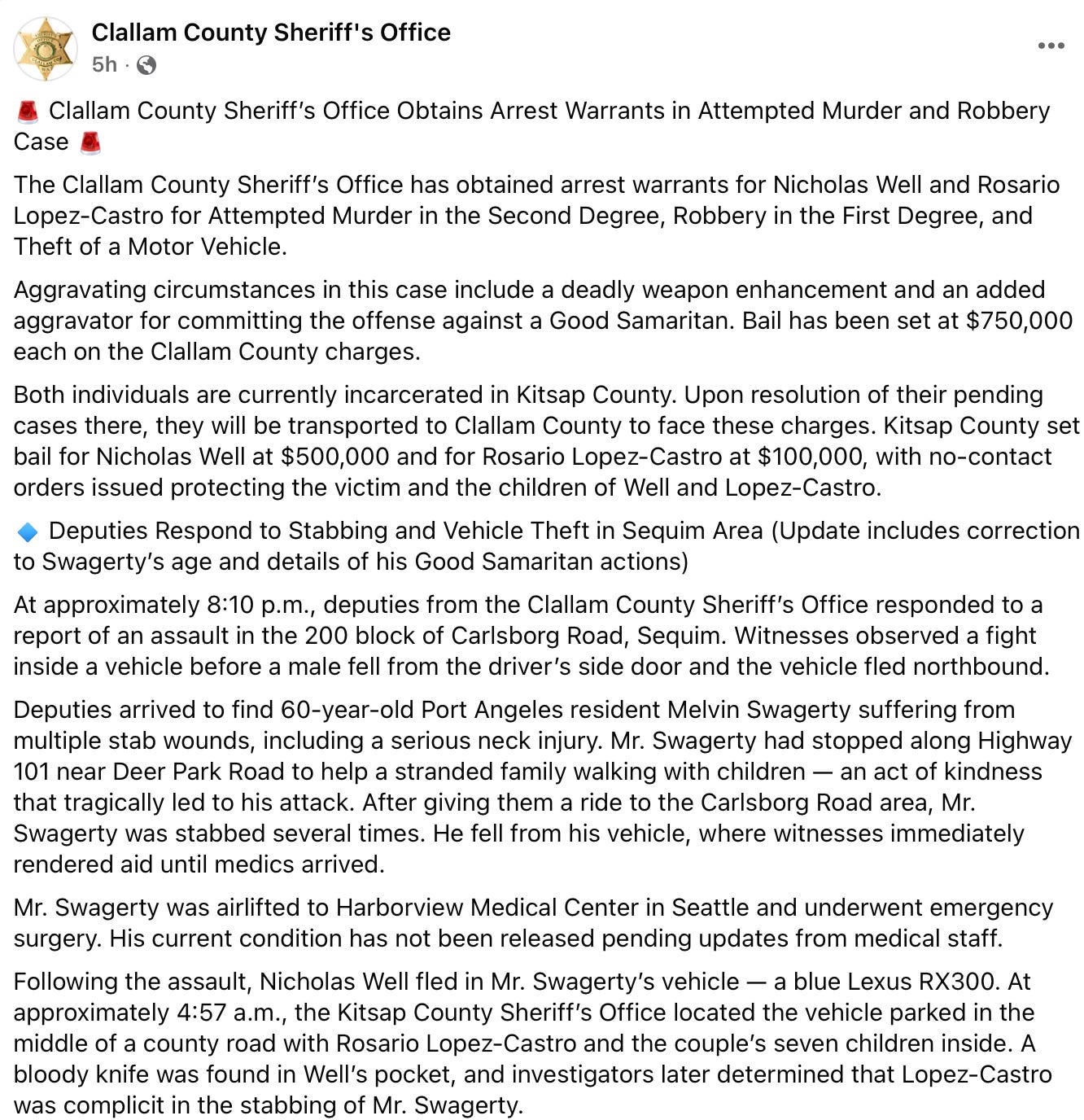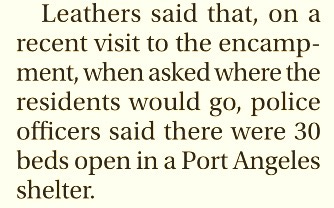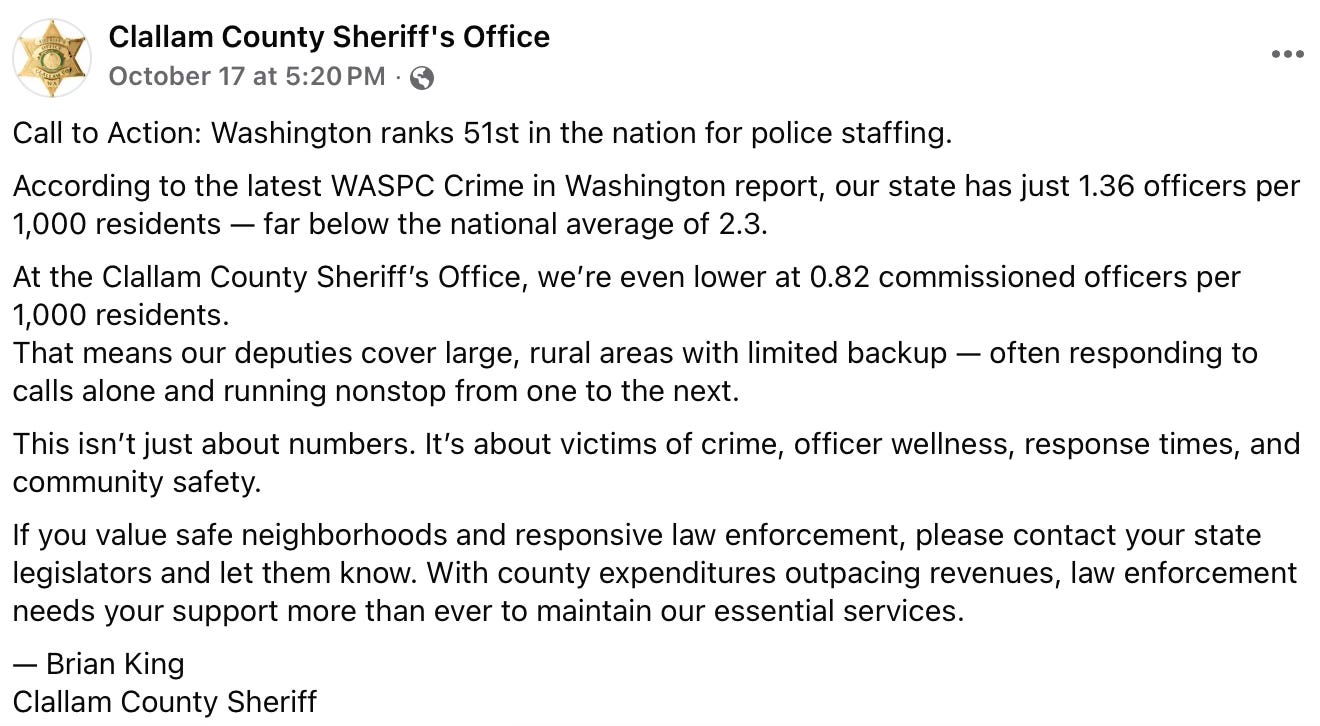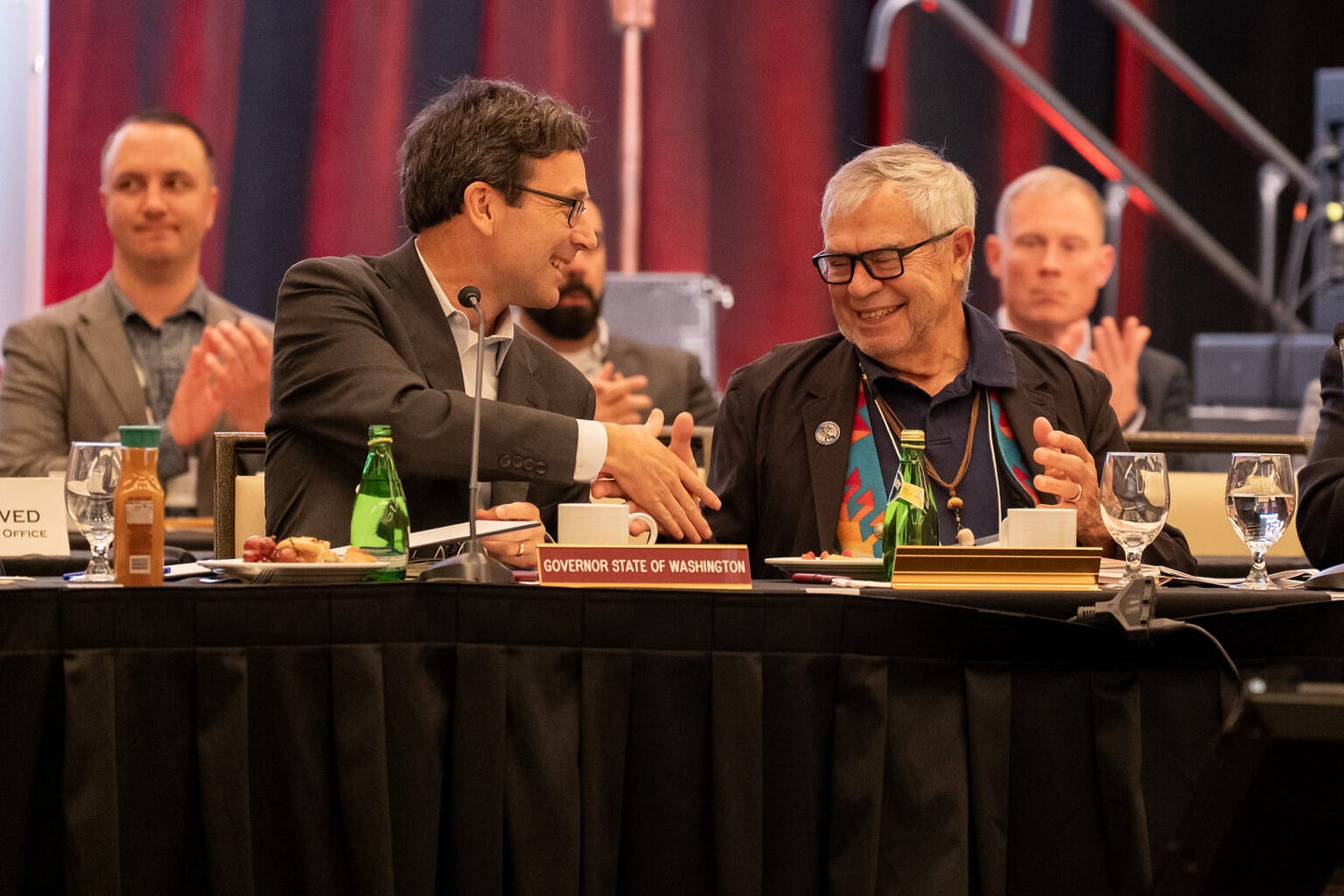Residents are looking to their city and county officials for protection, fairness and basic duty of care. Instead, too often they find selective enforcement, shuttered lines of accountability and serious questions left unanswered. The following collection of ten stories — from a Good Samaritan who was stabbed, to children in harm’s way, to local government’s dismissive posture toward the public — are a call for transparency, consistency and a reckoning with the gap between words and action.
A Good Samaritan Stabbed While Helping Others
Melvin Swagerty, a 60-year-old athlete with the local Clallam County Orcas chapter of the Special Olympics, offered a ride to a family walking on Hwy 101. He was attacked, stabbed multiple times in the neck, and left fighting for his life. The attacker allegedly commandeered his vehicle and fled with the family.
That a local athlete and Special Olympian became a victim of a violent crime is tragic. That the suspect had just been released from the Clallam County Jail hours earlier raises serious questions about public safety and accountability.
Local officials owe the public an explanation: What assurances are there that someone released so quickly will not pose a danger to others?
The Suspects: Seven Children, No Car Seats, and Plenty of Poor Choices
Court records show that Nicholas Well and Rosario Lopez‑Castro were located by the Kitsap County Sheriff’s Office in a stolen car shortly after the stabbing incident — with their seven children in the vehicle. Two of the children were apparently sitting on the laps of their passed-out parents; the others crammed into the back without car seats, shoes, proper clothing or supervision.
The day of the stabbing, Clallam deputies had stopped the same couple for reckless driving in Port Angeles and disturbances in Sequim. Well was arrested, booked for reckless driving and unlawful weapon possession — and released in just over two hours. Yet hours later, a violent crime occurred.
The community is justified in asking: Why was there no hold? Why were the children left in the care of parents evidently unfit? And how do we justify a system where the vulnerable — innocent children and good citizens like Melvin Swagerty — are exposed to risk while offenders walk free?
Drug-Addicted Parents on the Olympic Peninsula
Oakley Carlson: Five-year-old Oakley disappeared in 2021; this year a judge in Pacific County declared her legally dead. Her former foster mother expressed shock and says the move felt secretive and financially motivated. The parents, both with substance-use and neglect issues, remain persons of interest.
The Coffman baby: In the Sequim area, a one-year-old baby died from suspected second-hand fentanyl smoke. The mother was arrested but released because no referral was made to the Clallam County Prosecuting Attorney. Investigations continue, but justice is delayed.
The Port Townsend infant: The father, accused of hiding his child’s dead body in the bushes of a popular park, had charges dismissed for lack of evidence — despite a positive fentanyl test for the mother and other red flags. DCYF oversight ended with no meaningful accountability.
These cases prompt a painful question: Are we witnessing “harm reduction” – or a systemic surrender of duty? When addicted parents remain in control of children who die or disappear, the labels don’t matter, but the outcome do.
Who Pays When the Indigent Stand Trial?
The Clallam County Sheriff’s Office has obtained arrest warrants for Well and Lopez-Castro: Attempted Murder 2nd Degree, Robbery 1st Degree, Vehicle Theft — with enhancements for a deadly weapon and targeting a Good Samaritan. Bail is set at $750,000 each.
Yet if the suspects are indigent — as many in these cases are — the trial, housing, counsel, incarceration and court processes will all be paid for by the taxpayers of Clallam County. While citizens struggle under rising costs, public funds are devoting to matters that could perhaps have been prevented.
Our local leaders push for higher taxes and growing public burdens while allowing lax enforcement, early releases, and avoidable crime to flourish. Until prevention becomes priority, the system simply shifts costs to the rest of us.
Homeless Encampments, Shelter Beds and City Council
As the Nov. 3 closure of a homeless encampment in Port Townsend draws near, local officials say residents will be offered alternative accommodations — yet one resident reports that nearby there are 30 empty shelter beds in Port Angeles.
Meanwhile, Lindsey Schromen‑Wawrin – a Port Angeles City Council member – has joined a letter from a collective affiliated with Black Lives Matter of Jefferson County opposing the encampment cleanup.
What is a Port Angeles council member doing intervening in another city’s homelessness issues? Shouldn’t his focus be on his own constituency first?
The hypocrisy lies in the message: We’re told there isn’t enough shelter space locally, yet 30 beds sit empty; we’re told imported homeless populations aren’t the cause, yet residents of other cities are influencing our own local policy.
Clarity and accountability are overdue.
The Missing Reply and the Tax Hike
At a recent budget town hall, county commissioners confirmed they have not received a response to their August 26 letter to the Jamestown S’Klallam Tribe, which requested a conversation about tax contributions to offset revenue losses from tax-exempt parcels — a shortfall estimated between $1.1 million and $3 million.
Yet, instead of a follow-up, the commissioners instead launched a campaign promoting a property tax hike to voters. Commissioner Ozias even penned a Gazette column threatening cuts to essential services. This isn’t representation — it’s dereliction.
Taxpayers deserve better than letters left unanswered and priorities misaligned.

Undermanned, Undervalued: Sheriff’s Staffing Crisis
According to the latest report from the Washington Association of Sheriffs & Police Chiefs, Washington has 1.36 officers per 1,000 residents; the national average is 2.3. In Clallam County, the ratio is just 0.82.
This means deputies patrol large rural areas alone, respond to calls nonstop and without backup — compromising victim safety, officer wellness and community security. Meanwhile, budget shortfalls continue, and local leadership stalls.
When the County’s Poet Laureate program is fully staffed, but law enforcement isn’t, it’s time to talk about priorities.
State-Tribe Consultation Executive Order
Bob Ferguson signed an executive order to strengthen how the state consults with Native American tribes — drafting new policies, expanding training and giving the Office of Indian Affairs a permanent seat at the cabinet level. Tribal leaders responded favorably.
Yet in Clallam County, the commissioners cannot even get a response from a tribal corporation when asking to have a discussion about taxes. The scale may differ, but the principle is the same: Communication matters. Respect matters. Leadership matters.
“Why is it so hard for the state to uphold trust and treaty obligations and other obligations that are described outside of treaties? I want to ask this challenging question, to be transparent and to be direct, but also in a sense of how we figure this out together.” — Loni Greninger, Vice Chair of Jamestown Tribe
If the state can pledge meaningful consultation with Tribes, why can’t the County’s second largest employer, the Jametown Tribe, respond to a letter asking for a conversation about taxes?
Maybe improving consultation doesn’t go both ways.
Student Voices, School Decay and Tax-Exempt Land
A Sequim High School student letter to the editor of the Sequim Gazette noted: the district is underfunded, laptops break down, the track is failing and tennis courts are in disrepair. The student pointed out: “The Jamestown Tribe makes many wonderful donations to our community. Yet none of these donations go to our schools.”
Property owners pay roughly half of their taxes to schools. But because tribal trust land is tax-exempt, the Tribe’s exempt parcels weigh on the rest of us. The same tribe declines to respond to the commissioners’ request to have a dialogue about this growing tax burden.
How can we demand strong schools for our children while allowing tax avoidance by such a large corporation?
The gap between duty and privilege is growing.
Time for Change in Port Angeles Leadership
Marolee Smith Dvorak, running for city council in Port Angeles, draws attention to a fundamental question posed by her recent article: Should Port Angeles revert to a strong-mayor government when the current council/manager model appears adrift?
She reminds us that in 1952 the city shifted to a weak-mayor system to limit corruption, ensure professional administration and increase accountability. Now many feel decisions are offloaded, transparency is thin and “the people we elected” aren’t listening.
Incumbent Mayor Kate Dexter and the council should heed the warning. When leadership fails its basic functions, the only real respect lies in shifting the structure — not just more proclamations.





















